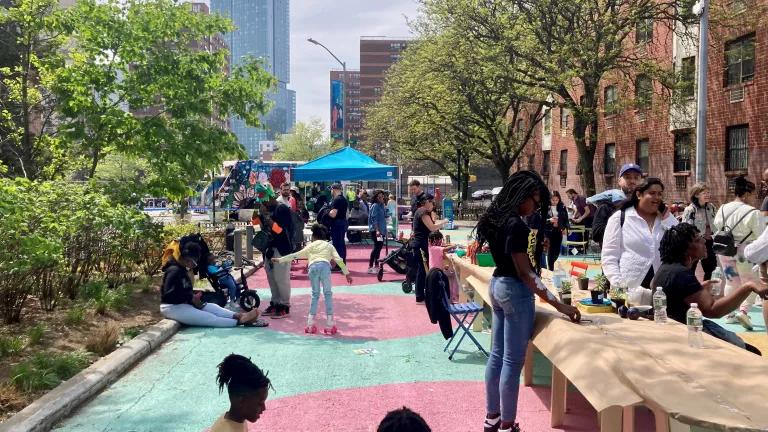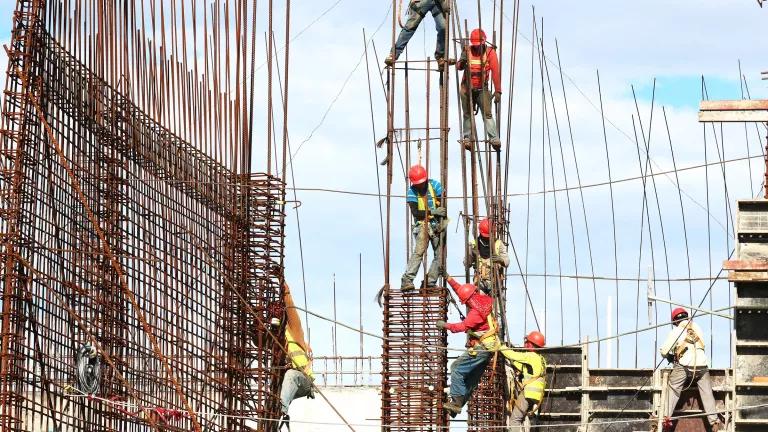Mayors Call for Bold Climate Investments
Over 140 mayors from across the nation have signed onto a letter urging Congress to prioritize climate investments in any infrastructure package and center the needs of cities and communities in the process.

Denver Skyline, Photo Credit: DavidJacks via Flickr
Over 140 mayors from across the nation have signed onto a letter urging Congress to prioritize climate investments in any infrastructure package and center the needs of cities and communities in the process.
Climate Mayors, a bipartisan group of mayors dedicated to climate progress, and their members call on Congress to pass the American Jobs Plan, prioritizing four critical areas to mayors:
- Send funds directly to cities from the federal government.
- When funds flow to states, ensure local governments are involved in how those funds are spent
- Prioritize historically disadvantaged communities and allow for flexibility in program administration
- Develop workforce standards that prioritize job quality and equitable access to well-paying high road careers.
The letter’s topline priorities say it all. These mayors want the opportunity to collaborate and innovate with the federal government to ensure cities will receive the much needed, direct funding for programs that will prioritize disadvantaged communities, create high quality jobs, and build communities back stronger.
The American Jobs Plan, as part of President Biden’s Build Back Better agenda, is vital to preparing our infrastructure to withstand the immediate and future impacts of climate change that mayors and their communities face head on right now such as drought, floods, and fires. With nearly 83% of Americans living in cities, federal support through the American Jobs Plan can accelerate and expand local efforts to build back better, providing cities and local governments with the critical support and federal funding that can move the nation forward.
Directly investing in cities works. For the last two and a half years, an initiative called the American Cities Climate Challenge has done just that. With support from Bloomberg Philanthropies, the Climate Challenge aims to accelerate cities’ sustainability and climate programs and strengthen local climate action by providing much-needed expertise and support on building, energy, transportation, and workforce actions cities want to take. The program’s focus on deep implementation has proved that we can take lofty climate goals and turn them into reality. And in order to hit the Biden-Harris Administration’s goal of the United States achieving 50-52 percent reduction of greenhouse gas pollution from 2005 levels by 2030, we will need unprecedented deep investments in climate action at the local level.
Mayors, cities, and communities are ready to meet this challenge. Mayors all over the nation took the initiative to tackle climate during the last administration’s inaction. And in this past year alone, local leaders have brought about several projects that have tackled climate, created jobs, and centered racial equity—all in the face of a global pandemic. The Climate Challenge has been proud to support several of these efforts:
- Renewable Energy in Columbus, OH: Following up on the successful ballot initiative passed in last year, in April of this year, the City launched a new community choice program Clean Energy Columbus, which will automatically provide residents and small businesses with electricity generated exclusively by Ohio-based renewable energy projects. It also establishes a Clean Energy Workforce Development Committee to support building a diverse, local workforce pipeline into clean energy and energy efficiency jobs and funds community grants in its rate, which allows the City to support workforce development efforts and reinvest equitably into the community.
- High-Performing Buildings in Boston, MA: Boston introduced a building performance standard in June, joining a group of cities in reducing the building sector’s massive carbon impact. The new standard requires all buildings in Boston above 20,000 square feet to achieve carbon neutrality by 2050. Importantly, environmental justice community members and community-based organizations were involved in the policy development process from the beginning and led to the creation of the Equitable Emissions Investment Fund and Review Board which will be directed by community partners who will oversee the equitable distribution of carbon abatement funds.
- Transit in Honolulu, HI: In December of 2020, Honolulu unveiled the first of 17 new electric buses and opened the first bus priority lane in more than 30 years to improve service and safety for island residents in one of the busiest corridors through downtown
- Low Carbon Transportation in Denver, CO: Denver City Council recently passed a new policy that will expand low-carbon multimodal options for residents and employees. The new Transportation Demand Management (TDM) policy will require developments to implement strategies that expand travel options, like offering subsidized transit passes, supporting carsharing, expanding work from home policies and more.
Cities don’t intend to stop there. They have infrastructure projects and plans that need billions of dollars of investment. And they need support from the federal government. They need the American Jobs Plan—a bold but necessary vision of infrastructure investments and climate action that can lead to a more sustainable and equitable future. Everyday mayors, cities, and communities are on the frontlines of climate impacts while also inspiring climate action. Congress must do their part: listen to mayors and invest in climate infrastructure.
This blog was co-authored with Janica Mendillo, Schneider Fellow.


